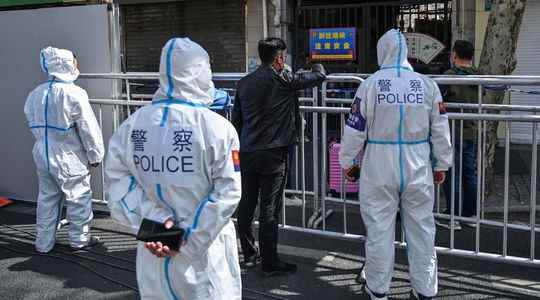Behind the figures, always subject to caution in China, there is the reality of an economy that is seriously marking time. If Beijing announces a 4.8% increase in its growth in the first quarter (compared to the same period in 2021) it is mainly due to a rebound at the very beginning of the year linked to the recovery in demand, robust exports and improved energy supply, following power shortages last fall. “But we are now facing significant challenges, acknowledged Fu Linghui, an official of the National Bureau of Statistics. The economy is facing multiple tests linked to an increasingly difficult and complex global situation and frequent epidemic rebounds. “.
A sweet euphemism for a country paralyzed by the Omicron surge: more than a quarter of the Chinese population, or 373 million people, are subject to some form of restriction of movement, according to a study by the Nomura bank dating from April 11. 87 of the 100 largest cities in China including Shanghai, and since this weekend the city of Xi’an, are confined – they represent the equivalent of 40% of Chinese GDP.
The blocking of the economic capital is particularly penalizing. “Shanghai is a very important industrial center, both for finished products, but even more so for high-tech components, for the automotive industry, electronics, or even new materials, describes Dan Wang, chief economist at the Hong Kong bank Hang Seng. But it is also a crucial center for high-level services: legal advice, intellectual property and finance, of course.”
Blocked supply chains
For weeks, traders in Shanghai’s business district have been camping in their offices while the rest of the population is starving and living in confinement. Monday, April 18, the GlobalTimes, the daily mouthpiece of the Communist Party, ensures that the situation is improving and that, for example, the giant Tesla factory will gradually reopen. But only 20% of the workers will return to the production lines and the American manufacturer is already ensuring that none of its electric vehicles can be exported to Europe in April. Same thing for iPhones, a large part of which is assembled in Shanghai.
The containment has indeed blocked all supply chains. Example in the port of Shanghai, the largest container port in the world where “weekly volumes have fallen by around 40%”, estimates Bettina Schön-Behanzin, vice-president of the European Union Chamber of Commerce . The port may operate 24 hours a day, but it is locked in a sanitary bubble and the lack of dockworkers slows down the transfer of cargo.
For the time being, 118 freighters are anchored off Shanghai waiting to be able to moor. The trucks that transport the goods only enter the area in dribs and drabs – many drivers refuse to make the trip or ask for bonuses equivalent to 300 euros a month. Nationally, rail traffic has fallen to 30% compared to its 2019 level.
According to analysts at Nomura Bank, the confinements could cause Chinese growth to lose two to three points this year, making it difficult to reach the 5.5% target set by the central government. Already, unemployment has climbed to 5.8% in March – and again, the figures do not include the self-employed, SMEs and traders who escape the statistics and find themselves without a job and without any social safety net .
Hundreds of events
“SMEs are by far the most affected and this is very important for the Chinese economy because they represent 80% of jobs, an important part of the growth and tax revenues of the country”, specifies the economist Evelyn Chang.
As a result, the social climate begins to become tense. Since the beginning of the month, the NGO China labor Bulletin has recorded around a hundred demonstrations in all countries: truck drivers, workers and even nurses have walked out in Shanghai where anger is brewing.
“Volunteers from neighborhood committees delivered food, cabbages, onions and a bottle of milk to us once in two weeks,” says Xu Yan – a 48-year-old mother from central Shanghai – who keeps like a treasure his last lettuce leaves in a vase. But we lack water, soap, toilet paper. There are four of us at home, it’s hellish. For the first time, I’m scared”.
How long will this nightmare last? Xi Jinping has already ruled out the idea of questioning his “zero-Covid” strategy before the XX Congress of the Communist Party which should see him reappointed this fall for a historic third term by acclamation.
“Xi Jinping is well aware that this policy of firmness gives him more political control and strengthens his strategic orientations towards greater economic autonomy, believes Yanzhong Huang, of the Center for International and Strategic Studies. This desire to move towards a state that controls all the actions of citizens should even continue in the post-pandemic era”.
